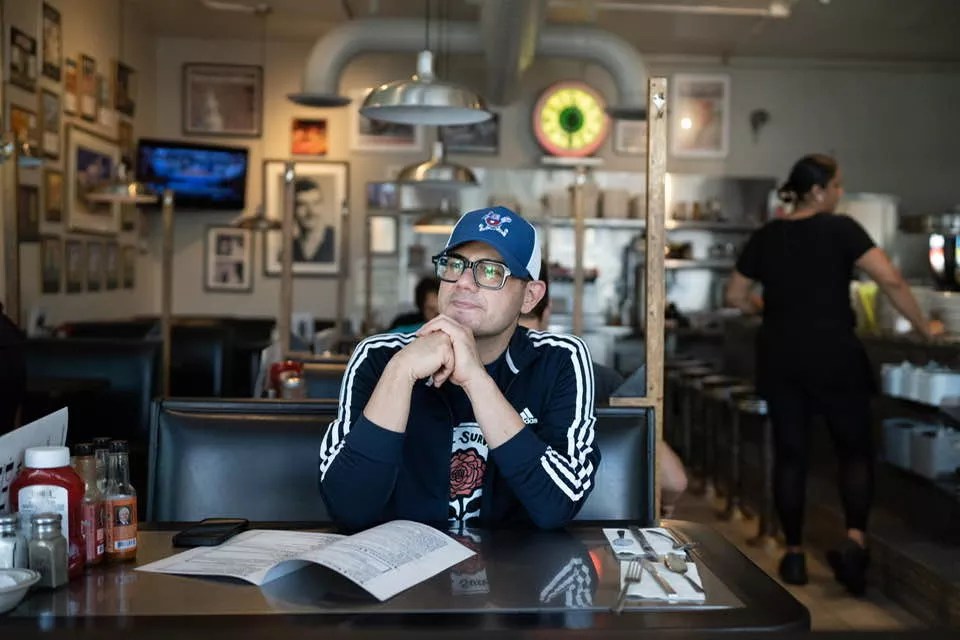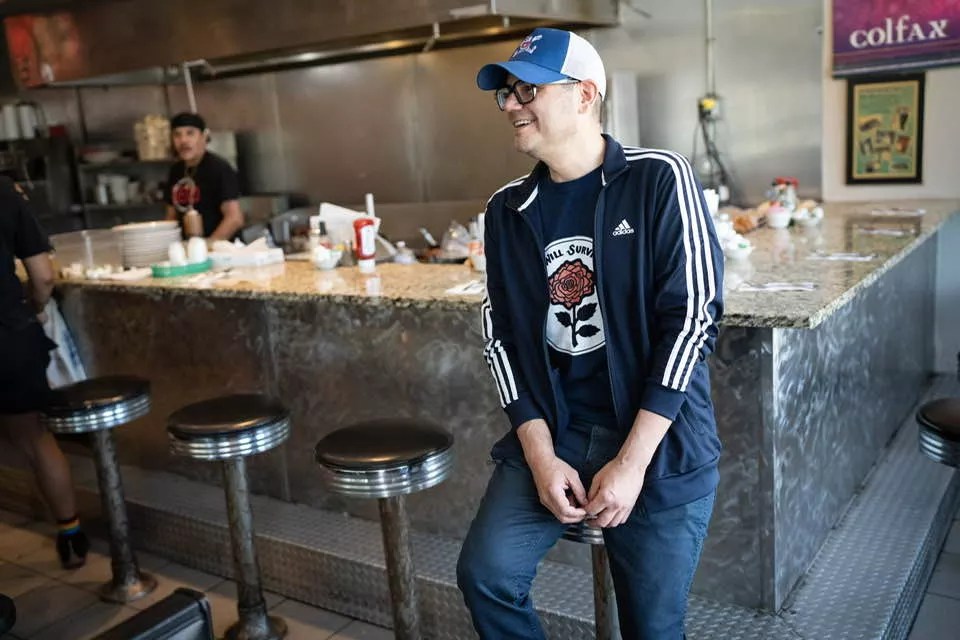
Hart Van Denburg/Colorado Public Radio

Audio By Carbonatix
Colorado Public Radio’s Vic Vela is an open book.
By now, that should be evident – with his personal story of drug addiction and recovery recounted in the first season of his podcast, Back From Broken. But for the newly launched season, Vela is ready to pull back the curtain even more.
“In the first season of Back From Broken, there was an episode on my story. But now it’s going to be kind of a part two,” he tells Westword. “It details how I deal with health crises while also trying to stay sober…and there’s gonna be a lot of Denver Nuggets basketball, so you’re gonna want to stay tuned for that.”
Back From Broken, which returned on July 7, discusses many types of recovery, with its most recent episode featuring the story of former Major League Baseball player Drew Robinson, who recovered from a suicide attempt in 2020 and now uses his platform to advocate for more mental health protections. The podcast offers a new episode every Friday.
People who’ve appeared on the show have shared their own stories of recovery, discussing everything from drug addiction to eating disorders and also grief. Their candidness has caused an emotional response that Vela hasn’t seen from any other project he’s worked on, he says.
“I can’t overstate that enough, how mind-blowing that is,” Vela says of the many listeners who’ve shared stories with him. The longtime Deadhead even met someone in the bathroom line at Dead & Company’s final run of shows at Folsom Field in Boulder earlier this month who told him that Back From Broken helped get him sober.
Vela, who grew up in Longmont, is a lifelong Nuggets fan and got to ride in a fire truck during the team’s NBA Championship parade. Covering the team and seeing it finally capture an NBA title – after going nearly five decades without one – came at just the right time for him.
“It was the emotional lift I just needed,” he says. “It was the most cathartic thing I’ve ever experienced. I cried like a baby. It was just magic.”
Vela, who has HIV, is currently in recovery for his addiction to powder and crack cocaine. This winter, he encountered a new health challenge: diabetes, which came on quickly and severely.
His eyesight became so blurry that he couldn’t even read text messages, and he lost weight rapidly.
Vela went to the doctor for routine blood tests related to his HIV treatment and discovered that his blood sugar was so high he was at risk of imminently falling into a diabetic coma. “Diabetes runs in my family,” he says. “It’s no surprise that I have diabetes. It’s no surprise that I was gonna get diabetes. But for it to accelerate from pre-diabetes to full-blown diabetes and into the stratosphere…out of nowhere was really alarming.”
Doctors told Vela that a November 2022 bout with COVID may have contributed to the rapid onset of diabetes in his body. He’s been getting back on track and has since added diabetes treatment to his regimen. Reminding himself of the medical advances he has access to that didn’t exist before has kept him positive throughout the difficult process.
Vela has a sensor on his abdomen that can show him his blood sugar levels at any time, and he’s able to treat his HIV with just one pill every night. “It is in my recovery, it is in my soul, to always find the gratitude in everything,” he says. “Or at least try to. That’s not easy when you’re suffering, but when I do that, I do better.”
He’s also grateful that despite his situation, he’s managed to maintain his sobriety.
“Not once did I ever think of hitting a crack pipe,” Vela says. “And thank God, because you talk about making it worse when you’re sick and you’re going through all this shit and you relapse on top of that…. If you stay sober and you call your friends, then you have a chance.”
At the beginning of the pandemic, recovery meetings had to be held remotely, so being able to return to in-person meetings has helped Vela stay the course. “The phone call is always important,” he says. “But there’s nothing like sitting in a meeting, hearing someone else’s story, sitting or standing around in a circle, saying a group prayer at the end of the meeting.”
It’s riskier than ever to be a drug user, Vela believes, on account of fentanyl being mixed into so many drugs now. He used to mix cocaine and morphine, which is easy to mess up – and can be fatal if done wrong. However, Vela always knew what he was getting himself into, which isn’t the case for drug users today.
“Nowadays with fentanyl, it’s not just the heavy, everyday addicts who are suffering,” he says. “It’s the people who are in college who only are taking this pill on a set Saturday night and they don’t wake up. It’s in cocaine. It’s in meth.”
Also, people are less likely to know their drug dealers today because of the internet. This gives dealers more leeway to sell a harmful product, Vela says, and he urges people to be selective if they plan to use illegal substances.
“I am not one of those prohibition-era people preaching abstinence,” he says. “I’m just begging you to go to dealers you know and go to dealers who have a good reputation.”

Vic Vela used to eat his only meal of the day at Pete’s Kitchen.
Hart Van Denburg/Colorado Public Radio
In sobriety, which began for him in 2015, Vela has gotten the chance to reintroduce himself to the Mile High City, including places like Pete’s Kitchen, where he says he used to often eat his only meal of the day in the wee hours of the morning.
He used to frequent the White Spot on Colfax, where Tom’s Starlight is now. A friend of his once shattered the pie case there, and the pair ran away before the cops came, Vela says.
Now he’s much calmer, but he still loves Denver history and being a patron of local businesses.
“I get to experience Colfax on a whole different plane,” Vela says.
Although he has made strides in his own recovery and shared his story with others to help them know they can recover, too, he says there are still plenty of things he’s working on – like his temper, for example.
Vela admits to having always had behavioral problems, which led to his barely graduating high school before heading to Metropolitan State University. When he was doing drugs, his temper – in combination with cocaine – would often result in a lot of destruction.
Sometimes he still feels like flying off the handle.
“It’s something that I’m always working on with my recovery sponsor,” he says.
According to Vela, most people who know him now don’t realize the extent of his struggles with his anger. Also, most people assume he’s an extrovert – probably because he’s so open about his life online and in his work.
“I’m actually rather reclusive,” he says. “I frustrate friends and family. … I don’t go to parties or barbecues or weddings or anything like that.”
Still, he wouldn’t trade the bond he’s built through his work with people in Colorado for anything.
“I love the relationship I have with people,” he concludes.